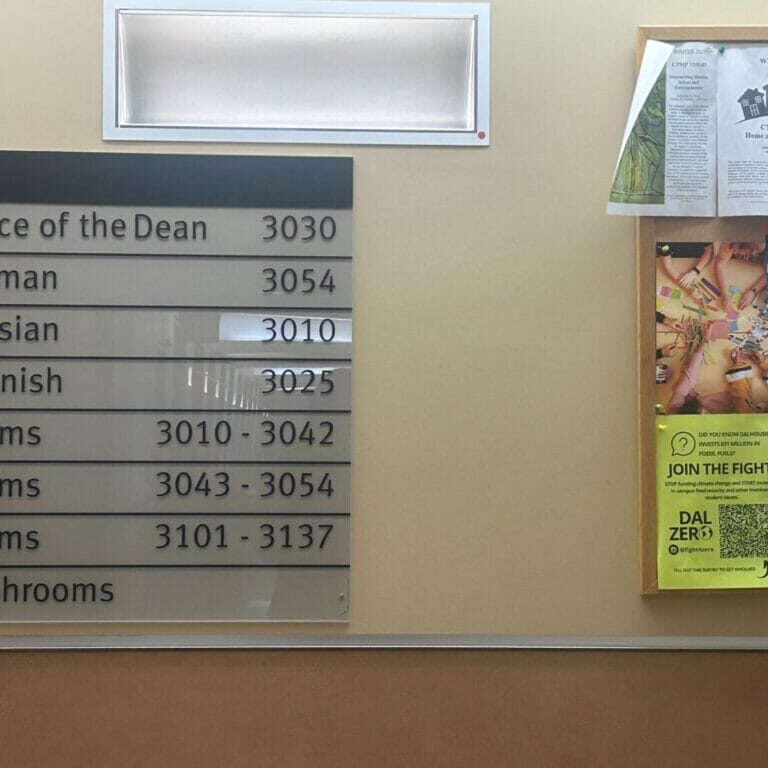
Hiring freeze ices out language programs
It’s expected that the 2,725 limited-term positions currently employed by Dalhousie will be cut by 60 per cent
Dalhousie University’s language programs are being threatened as the university’s hiring freeze prevents contract staff from being hired.
Dal announced the hiring freeze in late summer following a budget shortfall of $18 million due to reduced international student enrollment. The freeze, implemented on Sept. 4 of this year, impacts regular, ongoing, casual, temporary and limited-term positions.
The German, Russian, Italian and Chinese programs primarily employ temporary and limited-term faculty and staff. In particular, the Italian and Russian departments are composed exclusively of limited-term appointments and casual staff. Brigid Garvey, a professor with Dal’s German program, said this method of hiring is not conducive to the nature of language programs.
“If you’re going to run a program, you need someone who’s got a longer-term commitment,” Garvey says. “And it really seems like it’s been a policy for a long time not to replace those [positions] and to sort of slowly withdraw resources.”
Class sizes in language programs get smaller as the degree progresses, Garvey says, noting this is not an indicator of failure, but the nature of learning languages.
“You’re dealing with small numbers because you learn languages better in small contexts, and it’s a particular skill. So we’ve been losing ground for over a decade.”
According to Garvey, dean of the faculty of arts and social sciences, Jennifer Andrews made it clear there would be at least a 60 per cent cut to the 2,725 limited-term positions currently employed by Dalhousie.
Many professors who work in these limited-term appointments have been in their positions for years. Paolo Matteucci, an Italian professor, is an LTA (limited term appointment) who’s been working at Dal for a decade. He said the Italian program is doing incredibly well, with the maximum number of students permitted in a class being raised by 10 per cent to keep up with demand.
“In terms of number of students in the first year, no [other programs] have better numbers,” Matteucci says. “Italian brings revenues. It pays for itself, and it brings prestige. I don’t see how the university could benefit from making cuts [to Italian], because then you have less money and less prestige.”
Dalhousie’s media communications department declined the Gazette’s request for an interview or comment on potential budget cuts, but responded with an emailed statement.
According to the statement, “Dalhousie, like many universities across Canada, is facing a challenging financial scenario. University administration is working closely with leaders across the institution to assess resources, workload, and operational priorities. These efforts are spread across our campus, and are not unique to any single department or faculty.”
Garvey says the university’s language programs have been vulnerable for years. In 2021, they were promised two new permanent faculty positions and a new governance structure to organize the program, but no hires were made. According to Garvey, the program still had to continue with the new structure, which was built upon the promise of two new permanent staff members.
“I think we’re all really hoping that some kind of deus ex machina comes, some saviour comes who wants to sort of fund a School of Languages,” Garvey says. “We don’t need a building and we don’t need a special language lab. What we need are teachers with a stable position.”
Tessa Pysklywec, a student taking Italian and Russian classes this semester, is frustrated with the potential cuts to the program.
“I think both classes are my favourites this semester, and you can just see the kind of passion they have for teaching and for their students,” Pysklywec says. “Compared to other profs who don’t care as much, to have these people who are the ones getting left behind would be a real shame.”
Dalhousie anticipates the hiring freeze will remain in effect until the end of its fiscal year, on March 31, 2025. International undergraduate enrollment has dropped by 16 per cent between 2018 and 2023. Exactly which departments and programs will be formally affected is still unknown.
“The president wrote: well, [Dalhousie] can’t be all things to all people,” says Garvey. “When she [wrote] that in an email, I heard ‘we will be closing programs.’ That was what struck me to the heart.”






